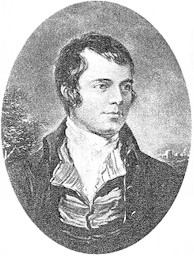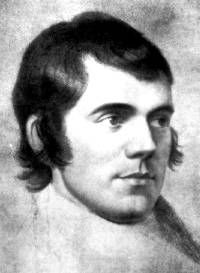Rabbie Burns 1759—1796:
The Pride of Ulster-Scots
The poet Rabbie Burns is often described as the Scottish National Bard, and quite understandably so. But Burns, like Shakespeare and Joyce, was certainly studied and admired far out beyond his homeland and by people of completely different ethnic, cultural and religious backgrounds. No wonder, as he was a great liver of life and lover of life - had profound insights into humanity and an uncanny ability to express this orally and in writing. You can see why in Northern Ireland in recent times, and with Northern Ireland being Northern Ireland, there have been expressions of hostility at the enthusiastic celebrations of Rabbie Burns in the month of January by “Ulster-Scots” groups.
Ulster-Scots enthusiasts have been accused of claiming Burns as their own, while not understanding the man and not sharing his values. As a Burns enthusiast myself, and someone who identifies himself as an Ulster-Scot, I certainly have not come across, anyone of similar ilk to myself, who does not fully understand the universal appeal of Burns and who has ever made any claims of ownership on the works of Burns. This does not mean however, that we Ulster-Scots, should feel guilty in any way, for embracing and fervently celebrating the birthday of one of the greatest writers of all time, just because we happen to share ethnic, cultural and religious backgrounds and have had similar political and philosophical ideals.
Now, I certainly do not think I have any more right than others to embrace Burns, as I wouldn’t want anyone telling me that I shouldn’t celebrate the works of Leonard Cohen and Bob Dylan because I’m not of North American Jewish stock. On the other hand though, we need to examine the reasons for this particular love of Burns, among many Ulster-Scots today.
First of all, it should be recognized, that many of the
inhabitants of Ulster during Burns’ lifetime were descendants of recent
settlers who had come over from Burns’ part of Scotland. In 1786, just after
the first edition of Burns’ poems and songs was published in Kilmarnock, his
verses began to appear regularly in the Belfast Newsletter . A
year later a second edition was published in Belfast by James Magee and so his
works became widely discussed, verses were quoted and his songs were sung in
many parts of Ulster.
The Ayrshire ploughman had won the hearts of kindred spirits in Ulster - several of whom made special trips across the sheugh in hopes of meeting the literary genius in person. A shared religion, by many, was no doubt a factor in the Ulster response to Burns. He was a Presbyterian, as were most of the Scottish settlers. At the time of Burns, the church in Scotland saw great conflict between the auld licht and the new licht and Burns got right into the fray through his poems and letters. This was also the cause of much theological debate in Ulster at the time.
Of more significance however, was the shared attitude- the philosophical ideals. This is best seen in the commonality of political viewpoints. Burns was a supporter of the values of King William III. On November 5th, 1788, he attended a church centennial commemoration of the landing of William at Torbay. Afterwards, in a letter, he spoke of the Stuarts and addressed “the folly of their attempts in 1715 and 1745” and followed with “that they failed I bless my God most fervently but cannot join in the ridicule against them”. Ay, Burns was firm in his political beliefs and yet liberal and hence his enthusiastic support for the American Revolution. In the same letter he said, “I dare say, the American Congress, in 1776, will be allowed to have been as able and as enlightened, and, a whole empire will say, as honest, as the English Convention in 1688; and that on the 4th of July will be as sacred to their posterity as the 5th of November is to us.”
It is obvious why the Ulster-Scots of his time, would have echoed these sentiments. The “Scotch-Irish” are attributed with being the chief instigators and to being at the forefront of all the stages of the American Revolution.
Burns was also vociferous in his support of the French
Revolution – a dangerous stance to take at the time. The spirit of the
American and French Revolutions, inspired his famous revolutionary song, “A
Man’s a Man for A’ That” with such lines as
“The honest man, tho e’er sae poor
Is King o men for a that”
and
“The man o independent mind
He looks an laughs at a that”
and
“ For a that, an a that,
It’s comin yet for a that,
That man to man the world o’er
Shall brithers be for a that.”
Again, the similarity with opinion and passion in Ulster is clear - the success of the French Revolution was celebrated on the streets of Belfast and as a consequence, Belfast Presbyterians formed the United Irishmen Society in 1791.
After the French Revolution, Britain came under threat of
attack from the New French regime and Burns joined the Dumfries Volunteers. The
Dumfries Volunteers were formed to defend the region against the possible French
attack and so on first consideration, there would appear to be a contradiction
of scruples here with Burns - but not so. While Burns supported the
revolutionary ideals and goals of the French, he saw himself as a “Briton”
and was opposed to the French threat on Britain against the will of the people.
In a song created for the Dumfries Volunteers, he wrote,
“But while we sing, God Save The King,
We’ll ne’er forget The People!”
Again, there are obvious parallels with the historic struggles of the Ulster-Scots people - British, yet always at odds with the British Establishment and prepared to fight for or against that establishment depending on what offered the greatest threat to the freedom and democratic rights of “the people.” Too much emphasis could be placed on Burns’ political ideals, however; no doubt they were not the main draw to the average Burns enthusiast in Ulster. What makes Burns stand out from most other great poets, was that he lived life to its absolute fullest. While other academics can portray the wonders of life in beautiful language as a result of their observation and communication skills - Burns went out there and got into the thick of it. His social relationships and interactions were exceptional by any standards, and the extent of his sexual relationships with women was outrageous. He was therefore able to provide great insight into the delicacies, perplexities, calamities, follies and profundities of life, with honest emotion.
Many of Burns’ poems and songs were in a vernacular that included an extensive use of Scots words and grammar. Very little of the subtleties and great humour would have been lost, therefore, on the average reader of Burns in Ulster - familiar with the Scots language.
When I was growing up in rural County Antrim in the 1950’s and ‘60’s, the poems and songs of Burns, could still be heard - handed down through the generations by admirers of his work. In more recent years, this appreciation of Burns has been on the wane, due obviously to the change in cultural focus as a result of modern communications, and the popularisation and commercialisation of an Irish culture that did not include Burns.
The revival of interest in “Ulster-Scots” in Northern
Ireland, is certainly helping to bring back an awareness of Burns, but
unfortunately, and understandably, this is an irritant to those Burns’
enthusiasts in Ulster who do not want to identify with Ulster-Scots. There is
certainly some justification to arguments I have heard them make, that the
majority of the people who attend formal Burns’ functions, do not fully
understand what he was about - and if they did, they wouldn’t be there. It is also perhaps reasonable
to assume that Rabbie himself annually turns in his grave on January 25th at the
conservative nature, pretentious perhaps, of traditional Burns’ Suppers. I
personally believe that he couldn’t care less and is more likely to be doing a
wee dance on top of his grave, lepin up and doon in glee at the fact that so
many people, of such different creeds and stations, are using the date of his
birthday as an excuse for a hooley - regardless of what fashion they do it in.
There is such a thing as just getting into the spirit of it all and as a matter
of fact, wouldn’t it be great, if everyone in Northern Ireland, could tune
into the spirit of what Burns was all about. I think then, there could be real
hope that we would have at least a greater mutual understanding of each other
- o wad some power the
giftie gie us
tae see oorsels as
ithers see us!
The meanings of the present day, popular, phrases, such as
“mutual respect”, “parity of esteem”, “tolerance” and “equal
opportunity” , are all thoroughly addressed in the works of Burns and the
negatives - “bigotry”, “intolerance” and “elitism” are creatively
exposed and ridiculed - as they should be...
“Oh ye, wha are sae guid yoursel,
Sae pious and sae holy,
Ye’ve nought to do but mark and tell
Your neebours’ fauts and folly;”
Willie Drennan